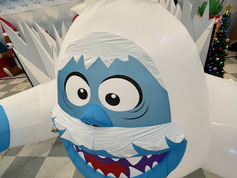The 95%
- horseshoemag
- Apr 25, 2025
- 3 min read
Contributing Writer
Michael Crowley
It’s 1:47 AM. The world is quiet again—too quiet, really. The kind of stillness that pulls strange thoughts from the back of your mind. Tonight I’m not thinking about stars or space or galaxies far, far away. Tonight, I’m thinking about the ocean.
Not the soft, summer-time postcard-perfect version. Not the sunlit waves brushing the shore or the soundtrack to a beach vacation. I’m thinking about what’s underneath. What we haven’t seen. What we haven’t even tried to understand.
It’s easy to forget, but we’ve only explored about 5% of our oceans. Five. Percent. That means 95%—the overwhelming majority—is still a complete mystery. There are valleys deeper than the Grand Canyon, mountain ranges taller than the Rockies, and ecosystems that have existed for millions of years without our knowledge. Yet we know more about the surface of the moon than the depths of our own planet.
That should be shocking. That should be headline news.But somehow, it’s not.
For some reason, we’ve accepted it—this gap in our understanding of the very world we live on. We talk about colonizing Mars, sending billionaires into orbit, and mining asteroids. But most of Earth remains untouched, uncharted, and honestly… forgotten.And it makes me wonder: why?
Why have we turned our eyes completely to the sky while ignoring what lies beneath us? Maybe it's because the stars are romantic, they feel aspirational. The ocean, by contrast, is dark. Cold. Pressure-filled. You don’t float through the deep sea—you sink, and maybe that’s part of it. Space represents escape, promise, and the future. The ocean demands we face the weight of what’s already here.
We should still care more.
In the 95% of the unexplored ocean, there could be entire ecosystems that rewrite what we know about life. There could be cures to diseases, ancient wrecks with untold histories, or creatures so strange they feel like they’re from outer space. We don’t know and that’s the point.
We are living on a planet that holds secrets it hasn’t given up yet—and we’ve stopped asking the right questions.
Some of the most fascinating discoveries of the last decade didn’t come from distant exoplanets. They came from submersibles diving into the Mariana Trench. From scientists finding fish that glow in the dark, and jellyfish that change shape like liquid ghosts, to microorganisms that survive in boiling vents and freezing cold, teaching us that life is tougher and more adaptable than we ever imagined.
We’re so used to thinking of Earth as "known territory" that we forget how little we truly understand.
Honestly, that scares me a little. It’s not just a matter of geography—it’s symbolic of something deeper. It reflects how we treat the familiar. We overlook it. We assume we’ve seen all there is to see. But beneath the surface of the ocean, of other people, of ourselves, there’s so much more.
The ocean is like a metaphor we keep ignoring. It’s vast. It’s full. It’s powerful. And it’s humbling.
It reminds us that knowledge isn’t something we’ve mastered—it’s something we’re always on the verge of discovering. We just have to be willing to dive for it.
And yeah, I get it—there are practical reasons too. Exploring the deep sea is expensive, dangerous, and technologically complex. But if we can send robots to Saturn, surely we can figure out how to better explore our oceans. The problem isn’t ability—it’s lack of attention.
Some nights I lie awake and wonder what we’ve missed. Not just species and structures, but opportunities. To learn. To connect. To marvel. I think about the stories we’ll never know because we didn’t look.
The age of discovery isn’t over, it never really was. We just stopped believing there were still places worth discovering.
But there are.
The ocean doesn’t just feed us or regulate our climate. It holds memories. It holds history. It holds life that continues whether we’re watching or not.
And maybe—if we listened, if we paid closer attention—it would teach us something about ourselves. About what it means to coexist. About how to survive.
So here I am. 1:47 AM. Thinking about the miles of mystery below the surface. And it’s comforting in a way to know that wonder still exists. That mystery still survives. That even now, in a world that feels so mapped and known and scrolled through… There are still places left untouched.
Maybe that’s where the magic still lives. Not above us—but below.
Michael Crowley will be joining Horseshoe Magazine as a columnist for the Fall 2025













Comments